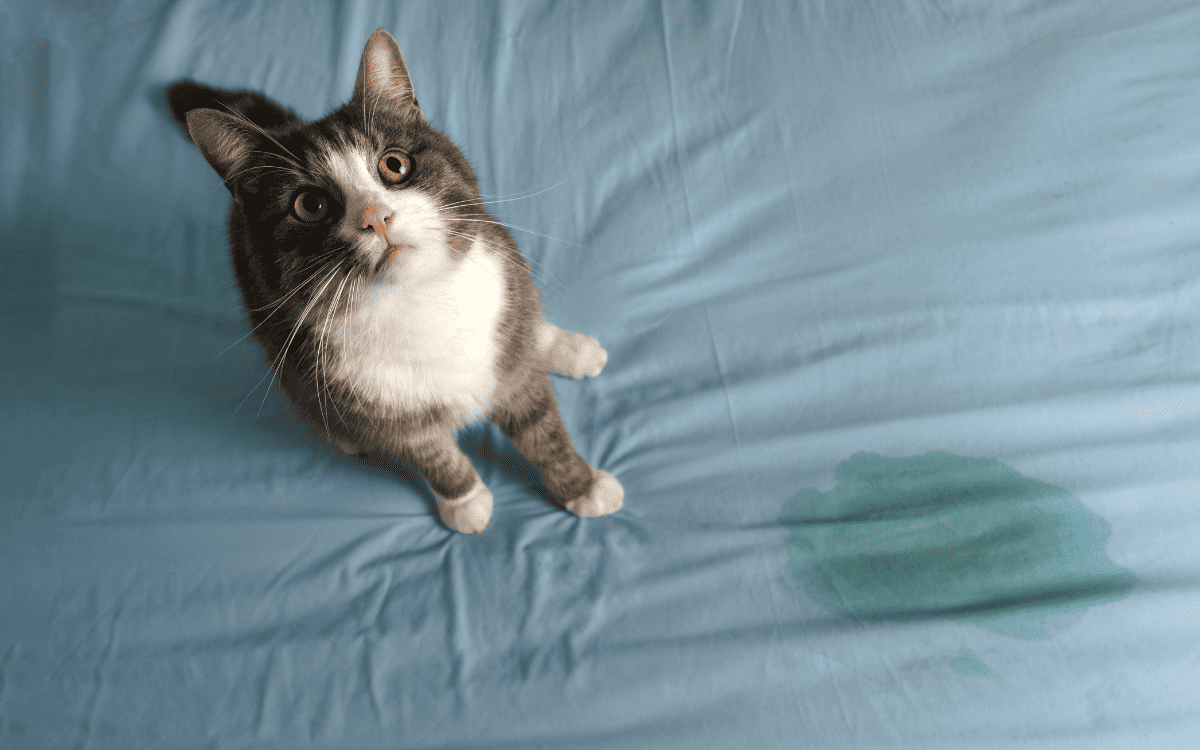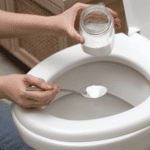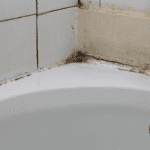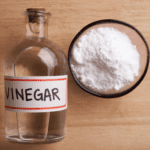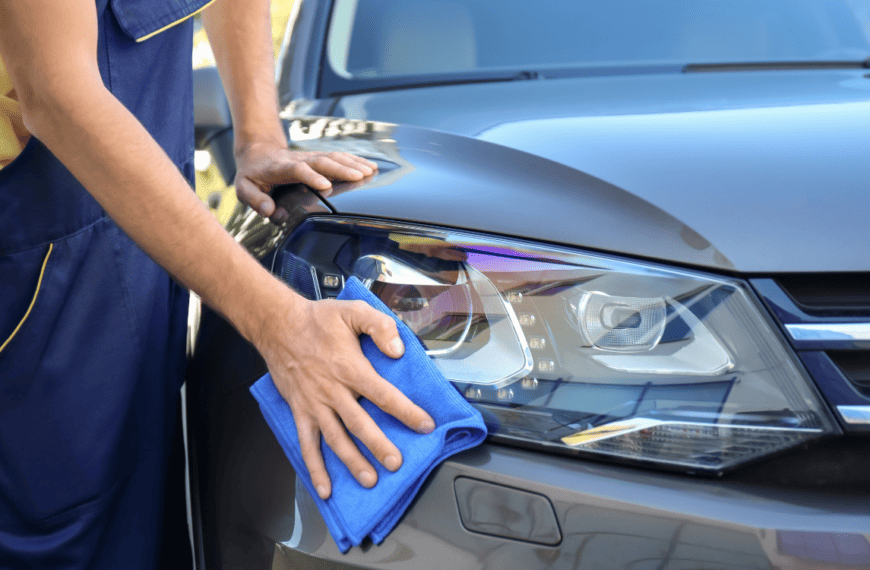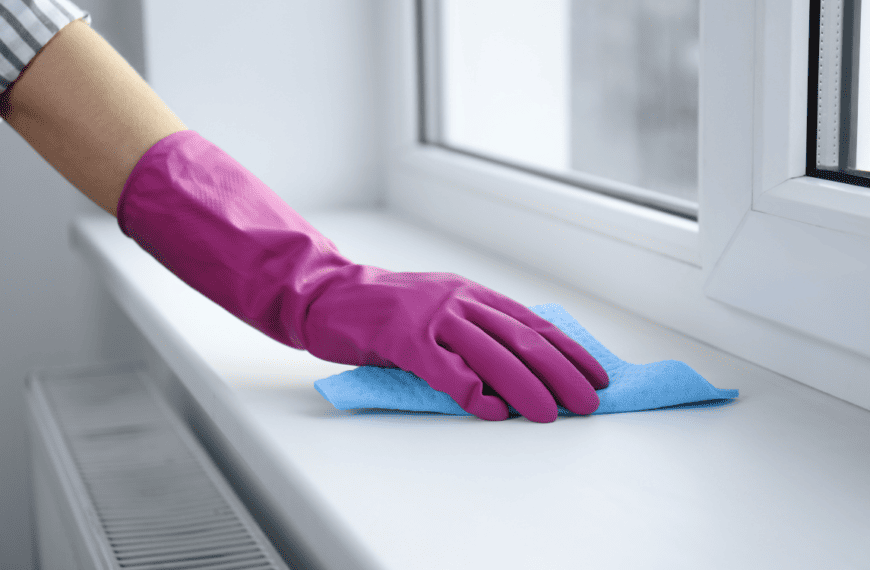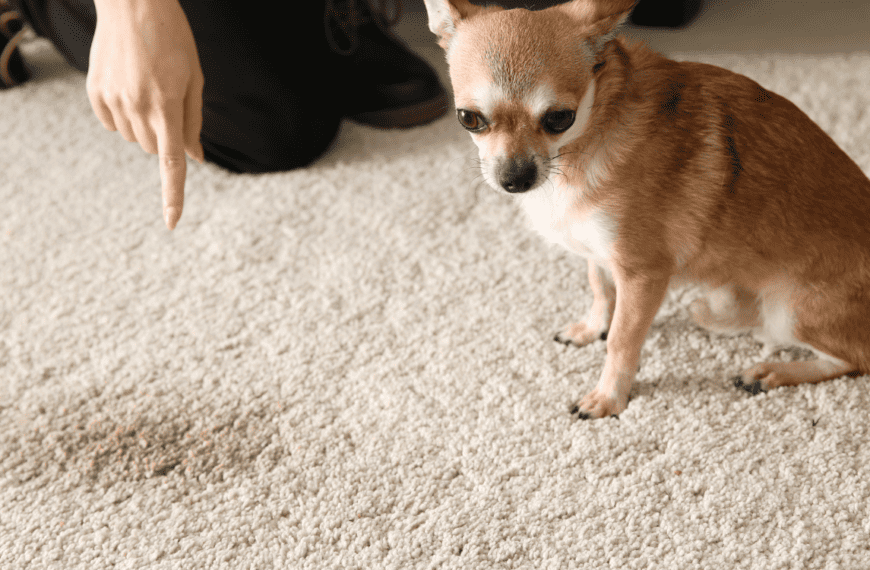As my mother-in-law recently discovered, adopting a cat always involves an adjustment period.
My MIL and her rescue, Sundae, instantly connected when they met, leaving us hopeful for a seamless transition to her house. Within the first day, it was apparent our expectations were a little too optimistic. In fairness, an unfamiliar place, strange people, and a hoard of overly enthusiastic grandkids can stress out any cat, so frankly, I’m impressed Sundae only had a handful of accidents.
The guest bed was Sundae’s default potty place for a few days, offering a cleaning challenge I hadn’t handled in a while. With the solutions fresh in my mind, I figured now would be a perfect time to discuss what works, what doesn’t, and what you can do to avoid the mess entirely. Discover the best methods to reclaim your bed with this guide on how to clean cat pee from a mattress.
Before You Begin: Critical Tips To Remember
- Clean quickly! Every passing second means a fresh cat urine stain is sinking deeper into the mattress and becoming harder to clean
- Use enzyme cleaners. Enzyme cleaner can sink into the mattress to follow the cat pee stain and eliminate any smell-causing compounds
- Discourage repeat performances. Cats are rarely one-and-done when peeing outside the litter box. Take preventative steps to dissuade your cat from restaining your mattress
- Identify the problem. Urine stains outside the cat’s litter box often indicate stress or illness. Investigating the reason your cat pees on the mattress will keep them healthy, happy, and less likely to have accidents
How To Clean Cat Pee From Mattress
A mattress can sometimes seem like a human-sized sponge ready to soak up any liquid that falls on it. While the old myth that mattresses double in weight over their lifetime is a little outrageous, there’s no doubt they can absorb a lot of material. Deep stains can be disheartening, especially when you think you fixed a pee smell and it returns on the first humid day.
Although it might seem like you can’t 100% recover from it, you can save a mattress with cat pee to the point that you’d never know there was a stain. The secret is reacting immediately after your cat has an accident. Pee soaks in fast. You must at least try to draw up the moisture as quickly as possible, even if you don’t have time for a full-blown cleanup.
Clean Your Sheets
Before cleaning your mattress, you must get the sheets out of the way. Your bedding was likely another casualty of any cat pee stains, so you’ll want to wash it promptly with an enzymatic laundry detergent.
Most detergents can handle urine in the laundry, especially if the pee is fresh. For added assurance, pour ½ cup of distilled white vinegar in with the laundry or use my preferred booster, OxiClean.
Blot Fresh Cat Urine Stains Before You Clean
Whether or not you can apply a cleaning solution to a fresh urine stain, you should always blot the stain immediately to extract excess liquid. Pee will immediately soak into the mattress and keep sinking in if there’s more liquid pushing from above.
Even if you don’t have the time or resources to remove the stain immediately, you’ll at least stop it from spreading by blotting it. Using paper towels, blot with firm pressure to remove as much cat urine as possible.
Sprinkle Fresh Baking Soda for Extra Absorbency
If you can’t apply a cleaner immediately, sprinkle a liberal layer of baking soda over the stain to draw up any remaining liquid and help neutralize the urine smell. Let the baking soda sit for at least 30 minutes.
After it absorbs all the cat urine moisture and sits for a while, you can suck up the dry baking soda with a vacuum. Powder this fine can ruin a standard household machine unless you sweep most of it before vacuuming. A wet-dry vac is a much better option that won’t risk damage.
Top Recommendation for Fresh Cat Pee: Vinegar Solution
White vinegar isn’t the most effective cleaner for cat urine, and it won’t guarantee that your pet will not remark in the same spot. But when you have light stains and cat odors around the house, it’s easily the most convenient solution and often perfectly suitable for the job.
If your cat pees on your bed and you’re frantically trying to clean it before it soaks in and dries, a vinegar solution is an excellent first choice when you don’t have an enzyme cleaner. You’ll save yourself a trip to the store, and it’s much quicker and easier to use than a more intense hydrogen peroxide blend.
Tools and Supplies
- Distilled white vinegar
- Water
- Spray bottle
- Paper towels
How To Clean Fresh Urine Stains With Vinegar
- Mix distilled white vinegar and water in a 1:1 ratio in a spray bottle
- Spray the stain liberally
- Let the vinegar solution soak into the mattress for at least 15 minutes before blotting with paper towels
- Leave the mattress uncovered to air dry (turn on fans or open windows to speed up the process)
- Optional: Sprinkle a layer of baking soda when time is up to help absorb some of the moisture and cat pee odor
Dish Soap and Water
Dish soap is another quick and simple cleaning method that can sufficiently remove urine and even get cat pee smells out if the stain is fresh. Alternatively, you can use an enzymatic laundry detergent to help break down the urine compounds.
The most critical points to remember with soap are that you must use only a small amount to prevent too many suds and rinse with water to clear the lingering residue. Rinsing removes the loosened urine and the suds, which can often attract more soil over time.
How To Use Dish Soap for Fresh Cat Pee
- Combine a cup of warm water with 2–3 drops of mild dish soap or laundry detergent
- Dip a clean cloth in the solution and blot the stain to saturate it
- Rinse the spot with another cloth dipped in fresh water
- Blot with paper towels to remove as much moisture as possible
- Optional: Sprinkle baking soda over the stain after cleaning to speed up the drying process
How To Clean Old, Dried Urine Stains in the Mattress
Maybe you tried the vinegar solution and still noticed a cat pee smell, or perhaps you didn’t get to your cat’s most recent accident before it soaked in and dried. Whatever the case, you’ll likely need something more heavy-duty than a simple white vinegar spray when you’re dealing with an old cat pee smell from the mattress.
Finding Old Cat Urine Stains in a Mattress
A dried urine stain isn’t always easy to spot or sniff out. If you’re having trouble finding the source of the cat pee smell in your mattress, grab a UV flashlight. The light only works on dried urine, reacting with the phosphorus in the stain to make it glow yellow. Flip the bedroom light off and sweep the bed to find any dried patches that might add to the urine odor.
Top Recommendation for Old Cat Pee: Enzyme Cleaner
If you have it on hand, an enzyme spray cleaner should be your first choice to remove urine stains, new and old. The enzymatic blend will sink into the mattress, breaking down the uric acid and other smell-creating compounds it crosses. As the enzymes degrade it, the cat pee converts to CO2 and water to evaporate away harmlessly.
Commercial enzyme products are essential for any dog or cat owner. They’re even effective on human urine, vomit, and fecal stains, making them indispensable in a full house. A few of my top product recommendations include:
- Rocco & Roxie Stain & Odor Eliminator
- Biokleen Bac-Out Pet Stain Remover
- Simple Solution Extreme Pet Stain and Odor Remover
Enzymes cleaners won’t damage your mattress, and there’s virtually no cleanup. Products may differ slightly in composition, but the general process is always the same. Spray the solution to saturate the cat pee-stained area, leave it to dry, and the urine smell will disappear!
Hydrogen Peroxide and Baking Soda
Hydrogen peroxide’s extra oxygen atom makes it highly reactive against organic stains like feces, urine, and blood. It lightens discoloration while killing bacteria that cause the smell. By adding baking soda and dish liquid, like blue Dawn, you get additional stain lifters and deodorizers. They also provide mild alkalinity that hydrogen peroxide needs to enhance the uric acid oxidation.
Hydrogen peroxide won’t deliver the thorough pee removal that enzyme cleaners can accomplish on deep stains. But to get cat pee smells out of a dry mattress and refresh the look of the cover, it’s the best DIY option.
How To Clean Old Cat Pee With Hydrogen Peroxide
- Combine one cup of hydrogen peroxide with 1–2 drops of mild dish soap in a spray bottle and shake well to combine
- Saturate the stain with the spray solution
- Let the solution sit for about 15 minutes
- Sprinkle baking soda over the area, and leave to dry
- Once dry, vacuum the baking soda dust from the mattress
Note: Some people mix 2–3 tablespoons of baking soda with the spray solution to cut out a few steps. Every time I have done this, the nozzle eventually clogs, and I’m stuck with a gloopy mess of baking soda paste at the bottom of the container. If you insist on using only a spray, either reduce the baking soda in the mixture or leave it out entirely.
Protect Your Mattress: Cat Pee Prevention Tips
Once a cat pees on the mattress, it opens the door for future accidents because it establishes their scent. And cleaning doesn’t ensure that your cat won’t do it again. A cat’s sense of smell is about 14 times better than a human’s. After cleaning and deodorizing the mattress to your satisfaction, your cat may still smell the faintest hint of old urine and return to the scene for a repeat performance.
Situations like these are why we constantly point to enzyme cleaners for removing cat urine. The bacteria and enzymes are the only way to reliably eliminate the urine and reduce the risk of remarking. But even these aren’t 100% guaranteed to work the first time, so you’ll want to take extra steps to prevent your cat from peeing on your bed.
The following are a few easy ways to protect your mattress from cat urine:
- Keep the litter box clean. Ensure your cat always has access to clean litter boxes. They might reject one if there is conflict between pets or it doesn’t meet their cleanliness standards
- Try a calming pheromone diffuser. A pheromone diffuser releases a relaxing pheromone that may reduce stress behaviors
- Enrich the environment. Keep your cat entertained with plenty of toys, cat trees, and other enrichment items to prevent unwanted behaviors and “spite peeing”
- Spay or neuter your pet. Desexed cats are much less likely to spray or exhibit behavioral issues leading to urine stains
- Close the door. If your cat can’t stop peeing on a particular mattress, you may have to block access to the room entirely
Get a Mattress Protector!
Any good mattress salesman won’t let their customers leave without adding a mattress protector to the order. A quality waterproof mattress protector will keep your mattress as fresh as the day you got it, easily shrugging off nighttime sweat and dead skin cells alongside random pet accidents.
Keeping a protector on your bed at all times is the most effective way of preventing cleanups and a persistent pee smell. They’re so critical to the bed’s performance and longevity that most mattress manufacturers will void their warranty if you don’t use one.
Why Does Your Cat Pee on the Mattress?
Reacting to your cat’s peeing problem may save your mattress, but it won’t take care of the cause. And ignoring the problem is often a disservice to your cat.
Cats can pee outside the litter box for numerous reasons. Conflict with other cats may mean they’re barred from certain boxes, leaving less appropriate places, like the mattress, as the only option. Stress may also arise from unfamiliar surroundings, new pets, or changing routines, leading to inappropriate urination and possible signs of idiopathic cystitis.
If your cat’s sudden change in behavior is challenging to explain, talk to your vet. Inappropriate elimination may indicate urinary tract infections or other underlying health issues. Additional signs often accompany inappropriate urination due to medical problems, including pain, lethargy, and GI upset. Monitor your cat’s behavior closely if you find them urinating outside their litter box to check for other indicators of a deeper problem.
How Do You Get Animal Urine Out of a Mattress?
Any of these methods will work on all kinds of pet urine and most human stains. In general, if it’s a bodily fluid, enzyme cleaner is the best solution to get it out. Regardless of the kind of stain or the type of animal that made it, the most essential part of keeping it manageable is to clean it as quickly as possible. If you can do that, any of these solutions will help you save your bed, whether it’s a simple vinegar spray or a commercial enzymatic cleaner.
Frequently Asked Questions (FAQ)
Are There Any Health Risks Associated With Cat Pee on Mattresses?
Cat pee on the mattress won’t just ruin your nightly sleep – it could also make you feel miserable during your waking hours! While feces is the more hazardous waste, cat pee can cause respiratory irritation as you breathe in the ammonia compounds from the mattress. Odors can cause nausea and GI upset. In worst-case scenarios, bacteria in the cat pee could even lead to an infection.
What if the Mattress Is Severely Soaked With Cat Pee?
At a certain point, you’ll have to make the call on whether a mattress is worth saving. Can an enzyme cleaner help restore a severely soaked mattress? It’s possible but not likely. And the amount of time and cleaning solution it would require can often make it highly impractical.
Can Cat Pee Permanently Damage a Mattress?
Cat urine can break down memory foam and other fill layers as it sits and sinks into the mattress. The added moisture can lead to mold growth, further damaging any organic components. If you leave them too long, cat pee stains can permanently damage the mattress’s structure, impacting its comfort and support.
What Can I Do if My Cat Keeps Peeing on the Bed?
The two best courses of action to keep your pet from peeing on the bed are to keep the door closed and use a mattress protector. There’s no reason to make extra effort to change the behavior if you have done everything possible to enrich the environment, make the litter box appealing, and keep your cat healthy. Keep the room off limits and a mattress protector as a backup when you forget to close the door, so your cat won’t have a chance to dirty your bed.

